#Campaea perlata
Explore tagged Tumblr posts
Text

Pale beauty moth (Campaea perlata), September 2023
Southwestern PA
2 notes
·
View notes
Text



found a Pale Beauty (Campaea perlata) today! flip a leaf, find a bug
469 notes
·
View notes
Text


Little moth friend snuck in and settled at my desk (Campaea perlata, Pale Beauty, I'm pretty sure!)
7 notes
·
View notes
Text

Campaea perlata/the pale beauty, around 1 am under the porch light
4 notes
·
View notes
Photo



Picea sitchensis or sitka spruce can grow up to 200 feet tall. They prefer sunny, moist to wet conditions. It’s the largest spruce species, and the fifth largest conifer in the world. They are host to over 200 species of butterflies and moths, including the pale beauty (Campaea perlata)
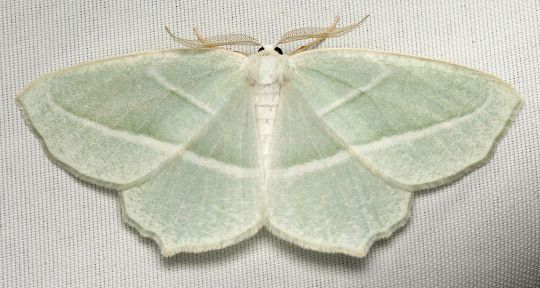
3 notes
·
View notes
Text

(Bad pic I know)
Pale beauty moth?
Scientific name: Campaea perlata
0 notes
Photo

Bug of the Day
The Pale Beauties (Campaea perlata) have started to emerge. Here’s a nice minty one :-).
1K notes
·
View notes
Photo

Campaea perlata, the very aptly named pale beauty moth. This cute little guy is part of the geometer moth family. I found him on the wall of a target :p
#Insect#Lepidoptera#Geometer moth#Geometridae#Pale beauty moth#Nature#Photography#Entomology#Lepidoptery#White#Pink#Banded#Lines#Brown#Beige#Pennsylvania#Campaea perlata
2 notes
·
View notes
Photo

au where rick is a moth prince and negan is out looking for a squatch but finds a cryptid drowning in a pitcher plant instead
close-up of moth prince rick:

#rick x negan#regan#negan#rick grimes#twd#click for better quality i think#if tumblr fucks it up ill just edit the caption with a close up of tiny moth rick#rick is a campaea perlata or a pale beauty moth#bc of the delicate blue wings that match his eyes#moth prince rick#gone squatching negan
151 notes
·
View notes
Text
volturi by moth types
aro: (catocala nupta) (x)

sulpicia: (cirrhophanus triangulife) (x)

caius: (campaea perlata) (x)

marcus: (paonias excaecata) (x)

athenodora: (manduca rustica) (x)

#the volturi#volturi#twilight saga#c: aro#c: sulpicia#c: caius#c: marcus#c: athenodora#look at these moths BAYBEE#moths always look like little worms wearing extravagant cloaks and i stan that#moths
25 notes
·
View notes
Photo


I was typing random letters into Google images and LOOK WHAT I FOUND! IT'S CALLED THE CAMPAEA PERLATA AND IT'S THE MOST AESTHETICALLY PLEASING MOUTH I'VE EVER SEEN!
10 notes
·
View notes
Photo

Pale beauty (Campaea perlata). Willistown, PA. June 2017. This is a fairly common moth that comes to lights in the early summer. As a caterpillar, pale beauties feed on many different kinds of trees, including birches, elms, oaks, and willows. It is not a picky eater in the Mid-Atlantic. Depending on the summer, there may be two generations in the Mid-Atlantic. Caterpillars are present from June onward, and resemble dead twigs. The caterpillars overwinter, and can occasionally be seen moving about on dead branches on unusually warm winter days.
1 note
·
View note
Photo

CAMPAEA PERLATA (Pale Beauty) - Composition Monday #PhotoOfTheDay #PaleBeauty #CampaeaPerlata #moth #shadow #nature #outdoors #TinyNature #habitat #ecosystem #AmazingPlanet #outdoorlife #roadtrip #SchroonLake #Adirondacks #NewYork #macro #MacroPhotography #NaturePhotography #Photography #NikonPhotography #Nikon #2017 #ErikMcGregor
© Erik McGregor - [email protected] - 917-225-8963
0 notes
Text
Spring Flowers, Part Two
For the last few weeks, I’ve been training for a backpacking trip on the Pine Mountain State scenic Trail. That simply means that I’ve been hiking the Knobs around Louisville with a backpack on, loaded with all my gear. The new Osprey pack I picked up at REI has been serving me well. Today I gave myself another opportunity to see what’s been flowering in April.
I drove up Holsclaw Hill to the Horine Section of the Jefferson Memorial Forest. I set out to do a 6.0-mile loop on the Red Trail and the Orange Trail, which makes three descents to streams that feed into Knob Creek--which means, of course, three ascents, as well. But what a beautiful day, the temperature in the 50′s and 60′s, cool with spots of rain.
The first colony I found was of the mayapples I wrote about last week--but these had an added discovery. Here is the flower itself:
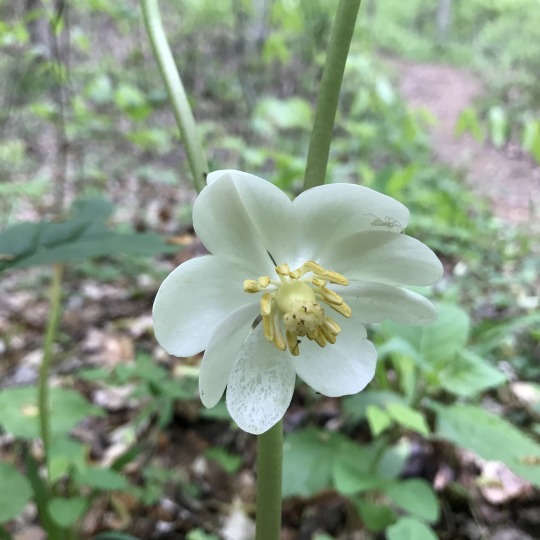
Note the little white spider, virtually camouflaged. Now look at this picture of the flower:
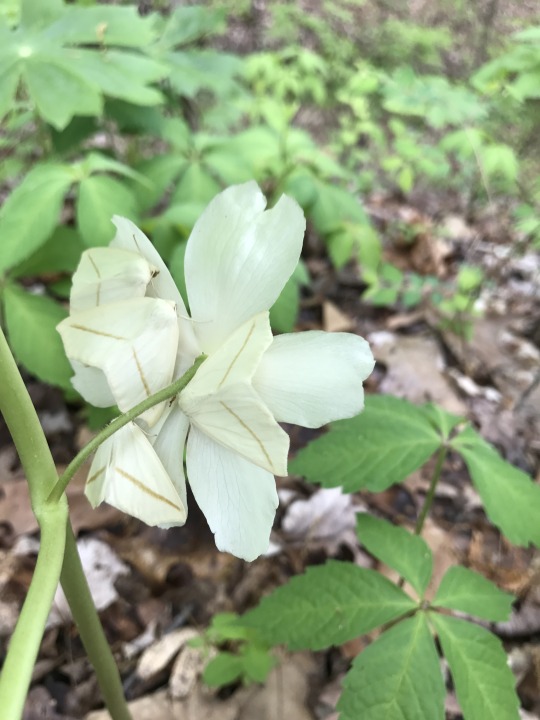
Do you see the oddity? Here’s another picture:
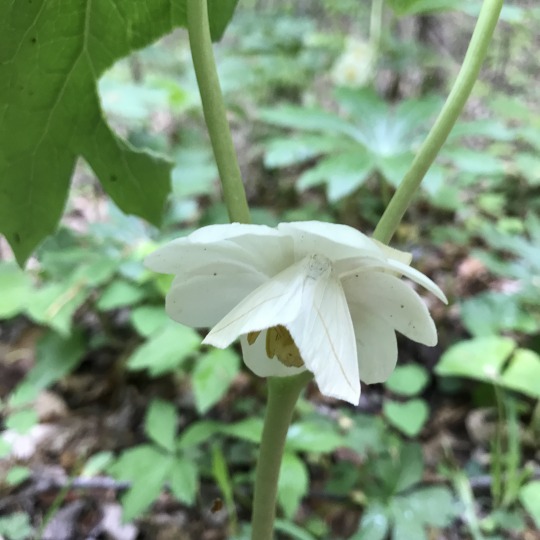
What looks like a flower petal is actually a camoflaged moth! This is the Pale Beauty, Campaea perlata, The first time, and only time, I’ve seen them are on the flowers of the mayapple.
Also in the woods, as I also showed last week (and this is a better photo), is the jack-in-the-pulpit:
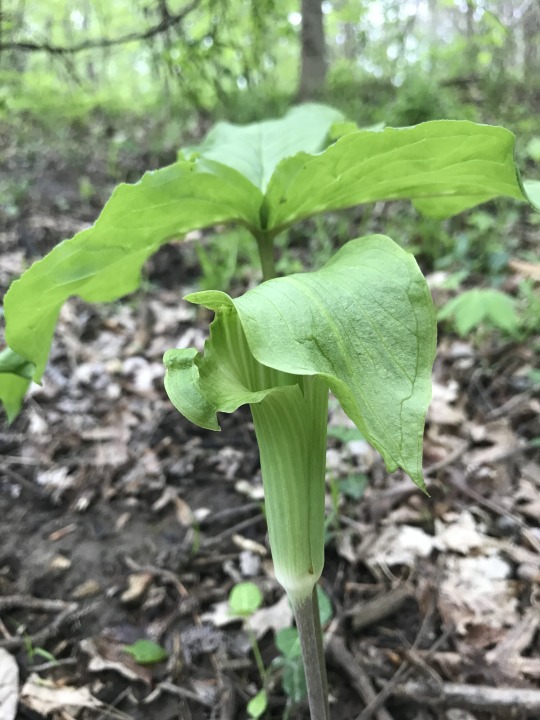
On the slopes of the ravines and along the creek bottoms are an assortment of flowers.
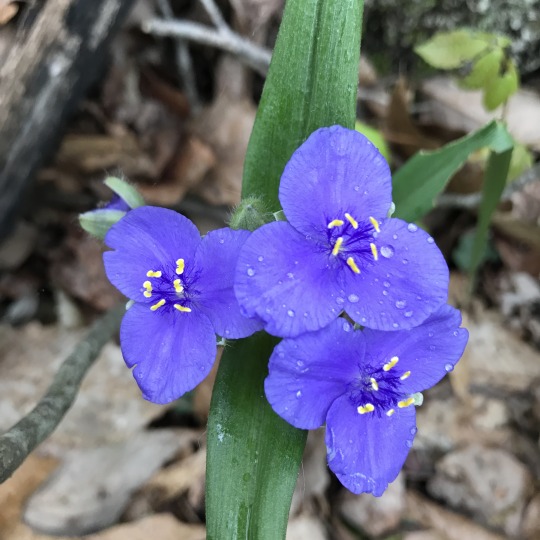
Spiderwort (Tradescantia virginiana)
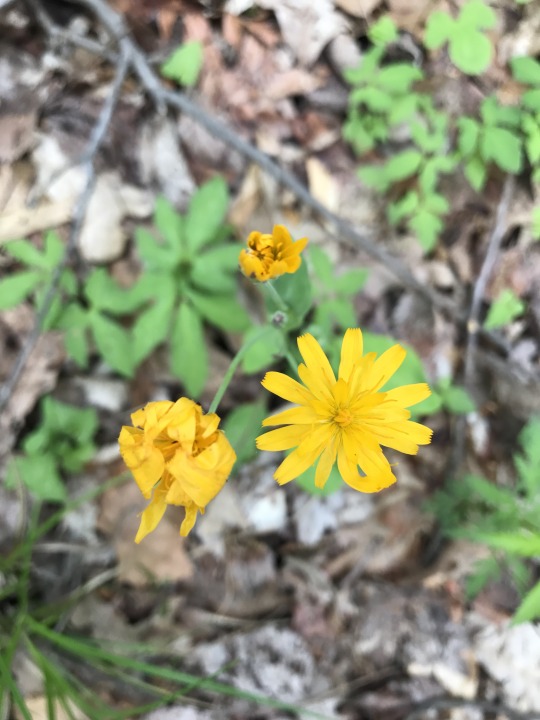
Yellow hawkweed, or King Devil (Hieracium pratense)
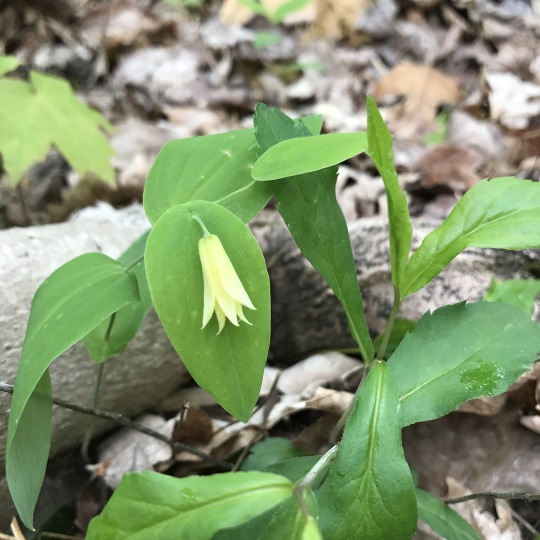
Smooth Solomon’s Seal (Polygonatum biflorum)

Another view of Solomon’s Seal
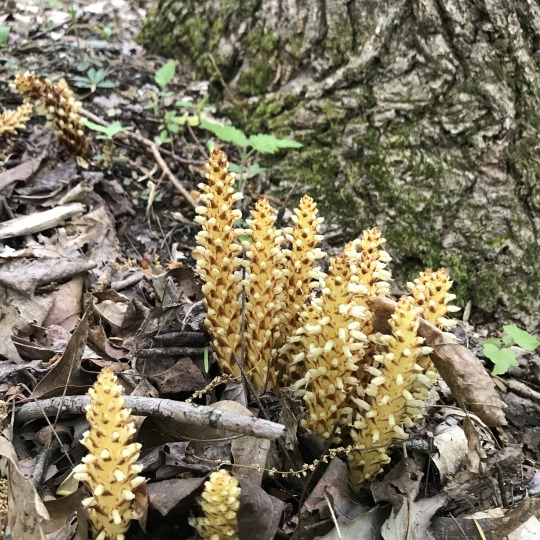
Squawroot (Conopholis americana)
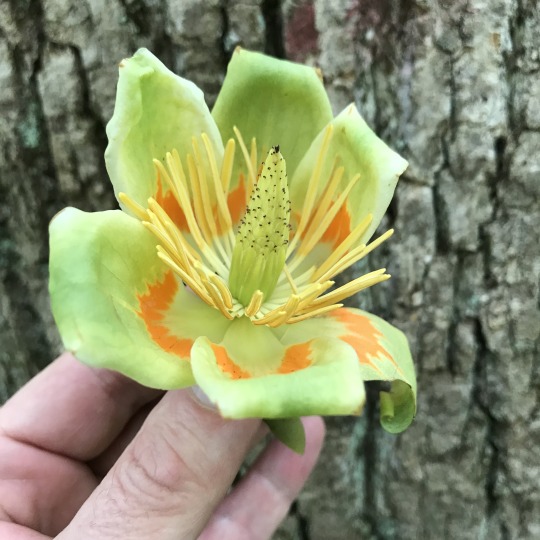
Tulip poplar (Liriodendron tulipifera)

Sweet white violet (Viola blanda)
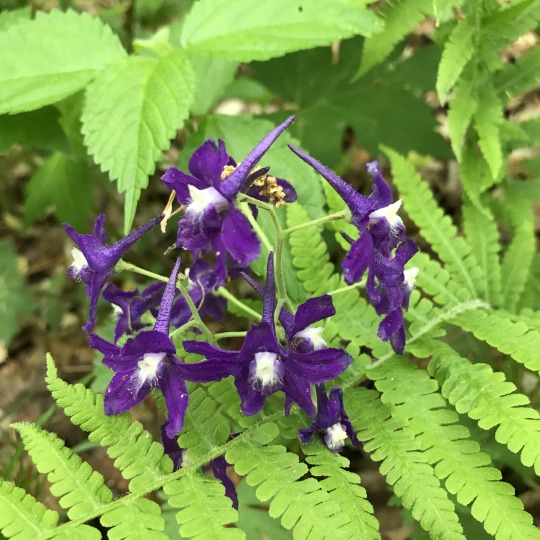
Dwarf Larkspur (Delphinium tricorne)
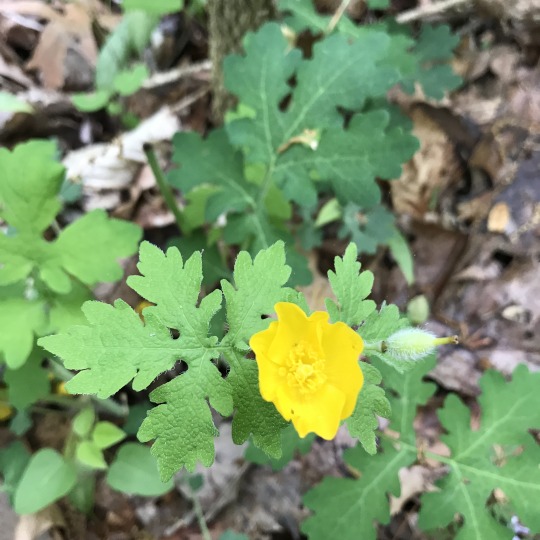
Celandine poppy (Stylophorum diphyllum)
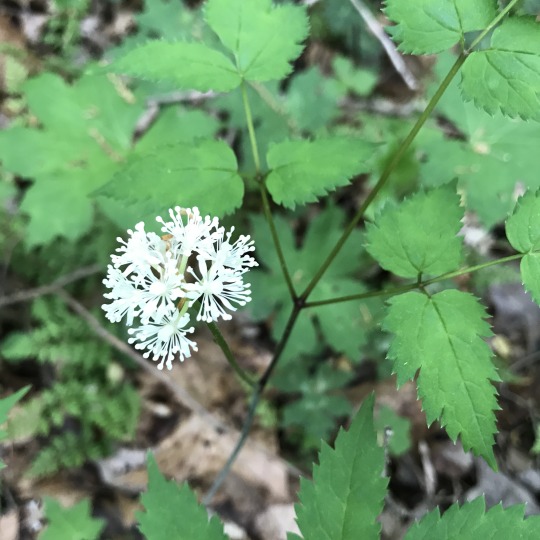
White baneberry (Actaea pachypoda)

Large yellow wood sorrel (Oxalis grandis)
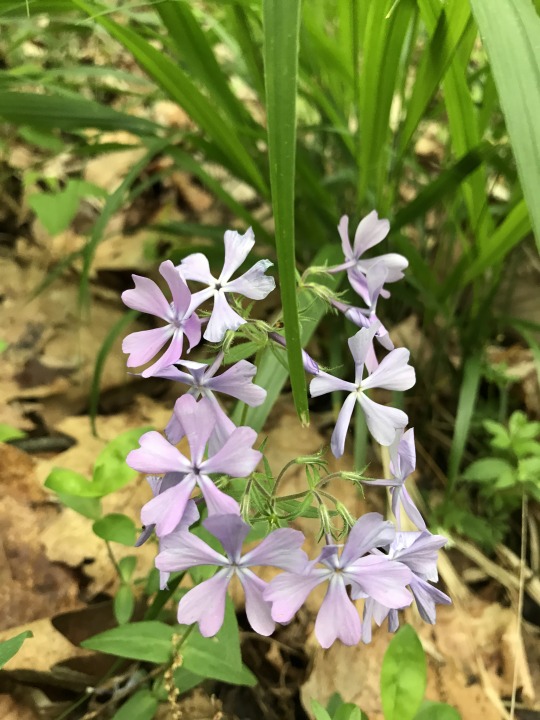
Wild blue phlox (Phlox divaricata)
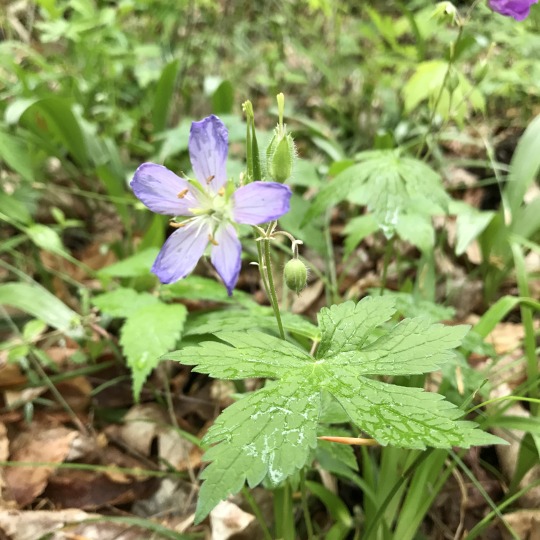
Wild geranium (Geranium maculatum)
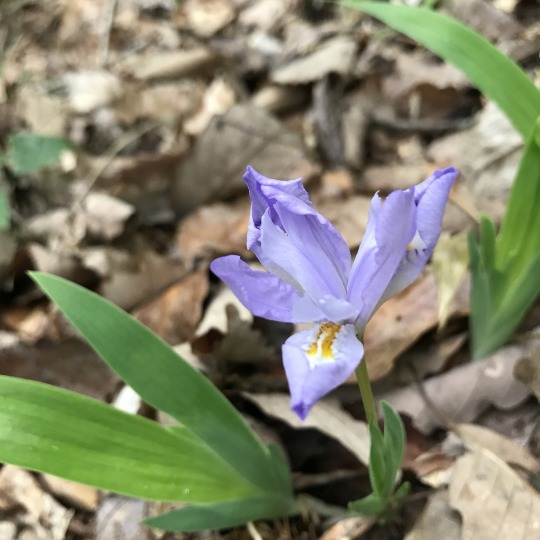
Crested dwarf iris (Iris cristata)
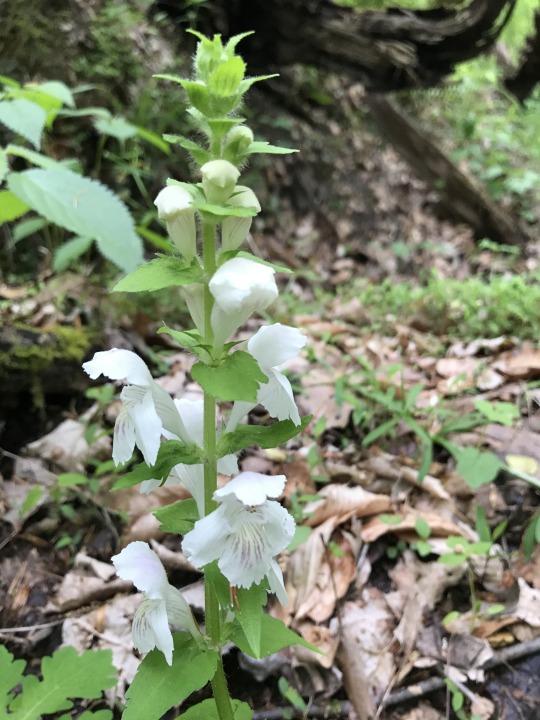
Guyandotte beauty (Synandra hispidula)
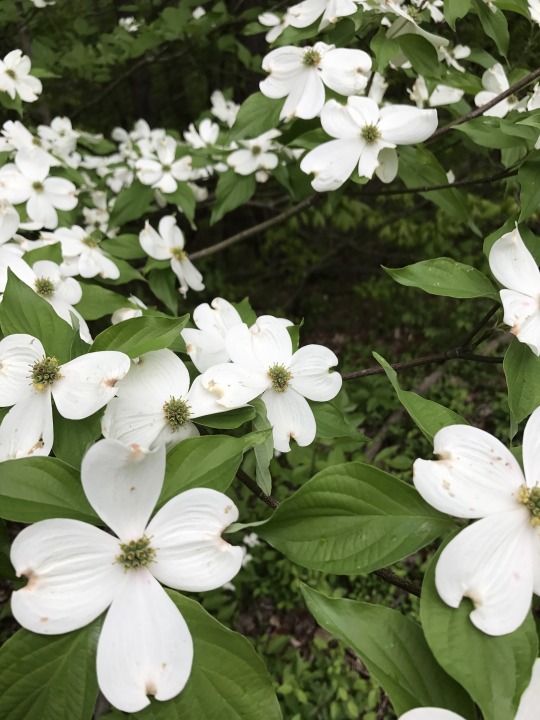
Flowering Dogwood (Cornus florida)
There were other sightings, as well. First, I saw a wood thrush in the forest atop the Red Trail’s sandstone ridge. Along the creek, I spotted a hooded warbler--I am lucky to have seen it. And driving out in the late afternoon, a wild turkey ran across the road, passing three crows milling in a field.
I hope you enjoy the flower show.
0 notes
